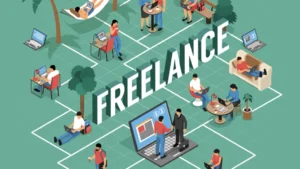How To Become Freelancer 2024

Freelancing is an amazing path to control your own career, work on things you love, and have the flexibility to work for yourself. How To Become Freelancer 2024 Getting started as a Freelancer can be challenging with so many things to consider, so in this article, we will show you how to start Freelancing in 2024 to make some cash on the side or even possibly create your own business full-time. How To Become Freelancer 2024 And most importantly you need to create your own bread and also work as making money for yourself. How To Become Freelancer 2024 Freelancer is a profession that allows you to create your own work schedule, to choose your clients, which freer offers you flexibility, independence and even take charge of your own life.
1 Identify Your Skills and Define Your Niche

- The first thing to do when starting freelancing is to reflect on the skills you have and the services you can provide to your clients. How to start freelancing Identifying your strengths helps define a niche that sets you apart from the competition.Example Steps to Find Out Your Skills and Niche:
• Make a List of Your Skills: Write down everything you can do, be it graphic design, writing, programming, or project management.
• Select a Niche: Based on your skills and interests, select a specific niche. So If you are a writer, you can write technical writing or blogs or copy writing.
• Market research: Look at online job boards such as Upwork or Freelancer and see what demand and competition exists in your niche.
A niche will enable you to target clients more effectively:: People will perceive you as a specialist rather than a generalist.
2 Create a Strong Portfolio

How To Become Freelancer 2024
- A portfolio is a demonstration of your skills and the work potential customers can expect from you. How do you get started freelancing If you lack work experience, build sample projects to showcase your skills.How to Build a Portfolio:
• Build samples projects relevant to your niche such as mock logos or example articles.
• Create an online portfolio through WordPress, Behance, or Dribbble for the purpose of showcasing your work in a professional way.
• Use testimonials and feedback from clients if you have experience with previous projects
Your portfolio must showcase your best work and represent the services you can provide.
3 Few Things To Do Before You Start As a Freelancer

How To Become Freelancer 2024
- You can start working as a freelancer by creating profiles on freelancing sites. How to start freelancing These platforms serve as platforms for clients to post jobs and freelancers to bid on jobs.Popular Freelance Platforms:
• Upwork — Best for professional projects across industries
• Freelancer — Marketplace for entry-level to experienced freelancers
• Fiverr: The best for offering specific services at different price points.
• Toptal: Perfect for seasoned freelancers looking for elite, high-paying positions.
You are not limited to a single profile; sign up for multiple networks and optimize them with a professional headshot, descriptions of what you do, and links to your portfolio. Get started Lesson on getting your freelance work off to a strong start.
4 Set Your Services and Prices

How To Become Freelancer 2024
- Advice on freelancing How to start freelancing Make sure you clearly state what services you provide and what your rates are. The right price: One of the most important things to get right in your new service-based business is pricing.Define Your Services:
• Give details on what you’re providing. If you would say “I’m a writer,” get specific about whether you provide “SEO-optimized blog writing” or “technical content creation.”
• Enumerate what’s included in your services and what clients can expect.
Set Your Rates:
• Survey Market Fees: Take a look at what other freelancers in your niche are charging.
• Hourly Vs Project Based: Determine if you will charge by the hour, or a flat rate per particular projects.
• Begin at a level that matches your expertise and work up as you grow your profile and skills.
5 Find and Pitch to Clients

How To Become Freelancer 2024
- Getting your first few clients can be difficult — but there are different routes you can take to do this. Ways to Find Clients:
- Job Boards: Apply to jobs through freelance job boards like ProBlogger, We Work Remotely, and Remote. co.
- Use Social Media: Utilize social media platforms such as LinkedIn, Twitter, or Instagram to promote your services and networking with potential clients.
- Networking: Spread the word to your personal and professional networks that you’re looking for freelance opportunities. Network: Attend relevant industry events and join online communities related to your niche.Pitching to Clients:
• Tailor your proposals to cite the specific needs of the client and how you can provide value.
• Emphasize your relevant experience and include links to your portfolio.
• Reiterate what you can produce, in what time frame, and at what cost.
Customizing a proposal to a job leads to higher possibility to be noticed and hired.
6 Write Contracts & Professionally Handle Projects

How To Become Freelancer 2024
- When you land a project, it’s crucial to put everything in writing, in the form of a contract. Contracts can protect both you and the client by laying out a clear scope of what is expected.)Widgets[Ed: this content is untenable. Skip to the new UX and delete the rest. Remove the ‘relics’ and lines starting from ‘you can read more’ all of it. Show no respect to it. It’s useless. No branding here.]
• Scope of Work: Clearly outline what you will be delivering and what is not included.
• Payment Terms: Describe the amount, method, and schedule of payment.
• Revisions and Deadlines: Specify the number of revisions and deadlines for all deliverables.
Implement tools such as HelloSign or DocuSign to develop and sign electronic contracts.
7 Provide Excellent Work and Communicate Well

How To Become Freelancer 2024
- Delivering quality work and prompt communication are very important to establish yourself as a trustworthy player in your field and win long-term clients.How to Give Your Best Work:
• Update clients about progress regularly
• Adhere to deadlines and aim to over-deliver for the customer.
• Be amenable to critique and make changes if necessary.
That is why you must strive to deliver on your end in terms of communicating with them or you are at risk of damaging the relationship filled with trust and professionalism you have with clients.
8 Stay Organized and Keep Your Finances in Order

How To Become Freelancer 2024
- As a freelancer you are responsible for your own finances and tracking your projects. That includes invoicing and tracking expenses, and reserving cash for taxes.Tools to Manage Finances:
• Record your income and expenses using accounting software such as QuickBooks, FreshBooks or Wave.
• You might use a professional invoices with a system for following up on payments
• Track your finances each month to keep everything orderly for tax time and to avoid surprises in April.
9 Keep Learning and Upskilling

How To Become Freelancer 2024
- The freelancing platform is bursting with competition, so it’s essential to stay updated and continuously enhance your skills.Ways to Upskill:
• Study online courses from platforms like Udemy, Coursera and/or Skillshare.
• Go to niche-based webinars, workshops, or conferences.
• Understanding new-demand tools and software in your industry.
Your skills can adapt, and that will give you a good career with more and more high-paid projects.
10 Establish Your Brand and Expand Your Enterprise

How To Become Freelancer 2024
- Focus on building your personal brand and growing your business as you complete every project and establish a healthy reputation.Building Your Brand:
• Build a professional website with a personalized domain to have a solid online presence.
• Blog posts, contents on social, or starting a youtube channel, do it.
• Ask clients to give testimonials and feature them on your business to build trust and authority.
As you scale, you can raise your prices, branch out your offerings, or even hire other freelancers to help on bigger projects
Final Thoughts
With the right plan and attitude, beginning a freelancing career can be a rewarding and profitable path. By taking these steps — identifying your niche, building a portfolio, setting up profiles, finding clients, and managing projects — you’ll be well on your way to building a successful freelancer career. Be tenacious, strive to continually better yourself and always seek to deliver supreme value to your customers, and the success will follow! FAQS
The Best Freelancing Platforms to Get Started
some freelancing platforms you can work from:
- Upwork: Best for beginners and freelancers in all industries.
- Fiverr: Specializes in small, specific services with different price points.
- Freelancer: Provides a range of projects and contests for freelance workers.
- Toptal: Reservations for elite freelancers with hundreds of jobs
How to Get Your First Freelance Client?
Getting your first client can be tough, but here are some tips that can help:
- Use Freelance Platforms: Get common jobs and plans that are in keeping together with your talents. Make each proposal relevant to the job for which you are applying.
- Network: Tell your friends, family and professional contacts that you’re freelancing. Network with professionals in your field at industry events or through online communities.
- Pitching Cold: Find businesses that could use your services and send them a personalized pitch.
What Are the Pros and Cons of Freelancing?
Benefits:
Flexibility: You can select how, when and from where you work.
- Varied Work: Providing services for a multitude of clients and industries.
- Control Over Income: Set your rates, and rise with your experience
Challenges:
- Unpredictable income: Freelance work can be erratic – particularly in the early days.
- Self-Discipline: You are require strong time management skills to keep up with deadlines and workload.
- Lack of Job Security: Owning a side hustle does not equate to a full-time job offering long-term job security or benefits


You are doing a excellent job. it’s very helpful, keep it up 🙂
I am a graphic designer and digital marketer so how I can start a work as a freelance jobs.
Nice
Great 👍
Evaluate the web site for its overall effectiveness.
Nice and informative
Good job, keep it up 🙂
Excellent
Great 👍👍
How to apply
Nice and informative
Great.
⚡ Electrifying analysis! Sprunki Game channels that same creative current.
Multi-style genius! Blend in Retro Bowl‘ collaborative studio!
Masterful analysis! While exploring browser games, Dinosaur Game offers unmatched entertainment.
Boundary-pushing design! Classroom 6x transforms puzzle-solving into an immersive narrative experience.
tdorgofumzjfivggdkhenzuegtkzde
irftjswwipqeknelgmsjgmzwtthnjf